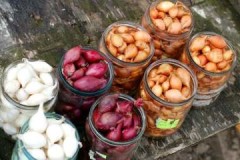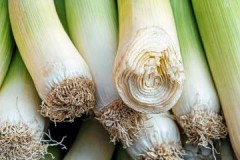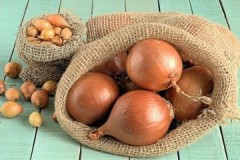An urgent question: can onions and other onions be stored in a cellar?
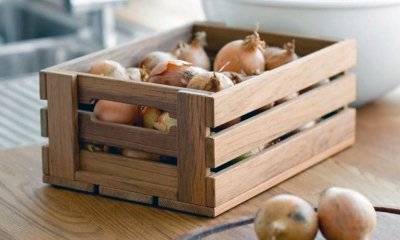 Onions grown in their own garden or bought for future use in the fall remain fresh for a long time. You can benefit from it until next summer.
Onions grown in their own garden or bought for future use in the fall remain fresh for a long time. You can benefit from it until next summer.
In order for the product not to deteriorate, it needs to create suitable conditions: adjust the temperature and humidity, choose the right "neighbors", and disinfect the room.
Read about whether it is possible to store onions in a cellar or basement in winter and how to do it correctly in the article.
Content
Is the basement suitable?
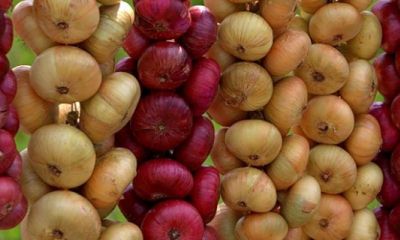 You can store onions in the cellar. Only late-ripening varieties are harvested for wintering..
You can store onions in the cellar. Only late-ripening varieties are harvested for wintering..
Bulbs with yellow husks and a pungent taste are best stored. A dense shell and an abundance of essential oils protect vegetables from spoilage. Red and white onions are stored much worse.
You need to start taking care that the crop does not deteriorate at the stage of harvesting... Dig up the bulbs carefully, being careful not to damage them.
Dents and cuts are the gateway for mold spores and bacteria. Even one rotten onion can spoil most vegetables. You can find out why onions rot and deteriorate during storage here.
Temperature and humidity
Optimum storage temperature for onions -1 ... + 3 degrees. Under such conditions, the metabolism inside the heads slows down, the vegetables seem to go into hibernation.
Recommended air humidity - 60-75%... In this case, the room must be well ventilated.
Care must be taken to ensure that the temperature and humidity of the air always remain at the same level. Their differences sharply reduce the shelf life of the product.
Training
You can't just pour the harvested crop into the cellar. In order for him to endure wintering, it is necessary to prepare not only the bulbs, but also the basement itself.
Preparing the vegetable
Before storing vegetables, they must be subjected to the following "tests":
-
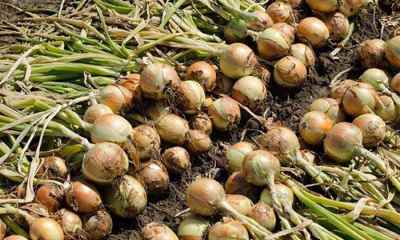 Dry the bulbs after digging them out of the ground. They are laid out in one layer, cutting off the roots to the very bottom.
Dry the bulbs after digging them out of the ground. They are laid out in one layer, cutting off the roots to the very bottom.The feathers are cut, leaving a length of 2 cm from the bulb, unless you plan to store them in a braid. During drying, the vegetables are turned over several times.
- Go through the dried crop, removing all diseased, dented or cut fruits.
- Sort vegetables by size. Medium-sized bulbs are harvested for the winter. Large and small specimens should be used first.
The dried and sorted crop can be lowered into the cellar.
Preparing the room
To prepare the cellar for winter, you need to do the following:
- Ventilate the room by opening hatches and doors.
- Move drawers and racks out into the sun. Under the influence of ultraviolet radiation, all microbes will die.
- Replace rotten racks.
- Treat storage containers with formalin solution. The boards can be burned with a blowtorch. This is done in order to get rid of mold and prevent its occurrence in the future.
- Whitewash the walls with quicklime. This allows you to reduce air humidity and provide additional disinfection of the room.
Winter storage methods
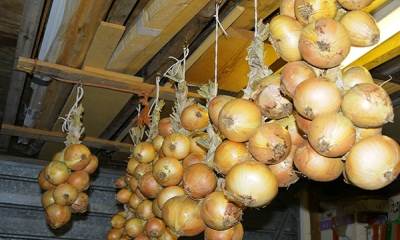 Onions can be stored in braids and wreaths. They are woven for dried feathers. For a more secure fixation, use straw or twine. Finished braids are suspended from the ceiling from a horizontal bar.
Onions can be stored in braids and wreaths. They are woven for dried feathers. For a more secure fixation, use straw or twine. Finished braids are suspended from the ceiling from a horizontal bar.
This method is good in that it significantly saves the useful space of the cellar, and the bulbs themselves do not contact the surface of the shelves and with each other, therefore they rot less often.The optimal number of copies in one braid is 15 pieces.
Storage of crops in nylon tights is no less popular. They are also hung on a pole. Tights can be replaced with linen bags.
Onions are stored in bulk in wooden boxes or in wicker baskets, in lattice containers. At the same time, there should be enough free space for air ventilation. It is convenient to use boxes with legs. They can be stacked on top of each other, but the embankment layer in them should not be higher than 30 cm.
How to extend the term?
There are several ways to extend the shelf life of a crop:
- to prevent the germination of the bulbs, the bottom can be burned or treated with lime paste;
- the chalk-based powder will protect from the spread of rot - it will take about 200 g for every 10 kg of vegetables;
- so that the bulbs do not dry out, they can be mixed with the peeled husks - it will maintain a normal level of humidity in the storage containers.
"Good" and "bad" neighbors
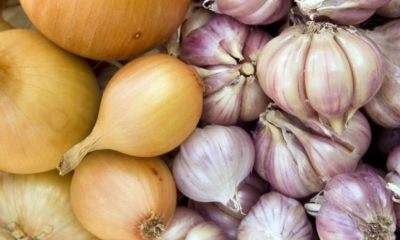 Onions can be stored in one container with garlic... These vegetables have the same environmental requirements and do not cause mutual spoilage.
Onions can be stored in one container with garlic... These vegetables have the same environmental requirements and do not cause mutual spoilage.
Another “good” neighbor of onions is pumpkin.... It can be placed in close proximity to root crops.
Onions are not stored together with other vegetables and fruits, but this does not mean that a new cellar needs to be built for potatoes or beets. They just need to be placed as far away from each other as possible, on opposite sides of the basement.
Exceptions are apples... They produce a gas called ethylene, which accelerates the maturation and decay of bulbs and other vegetables.
Helpful information
To keep the onion crop better, the following tips should be taken into account:
- From time to time, vegetables are inspected, removing rotten specimens.
- If the cellar is too damp, you can place containers filled with sawdust, lime or wood shavings in the corners. They will absorb excess moisture.
- Injured bulbs do not need to be thrown away. The upper husk is peeled off from them. After a while, the pulp will dry out and turn into a casing layer. These root vegetables can be stored in egg containers if size allows.
- The room is regularly ventilated, at least once every 14 days. Onions are very demanding on quality ventilation.
IN this This section provides a lot of useful information on how to store onions.
Conclusion
You can store onions in the cellar. The main requirements that he makes to the environment:
- the air temperature is not higher than +3 degrees and not lower than -1 degrees,
- humidity within 70%,
- high-quality ventilation and cleanliness in the room.
If these conditions are met, then the harvest can be preserved until the onset of warmth.

